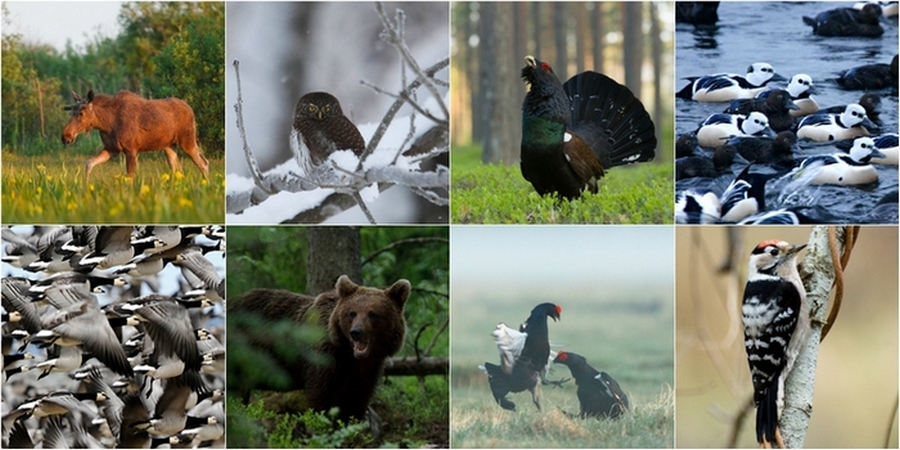These are the 7 of best wilderness areas in Estonia for mammal or bird watching and just spending time in Estonian nature. You can take part in tours or explore these on your own with self-guided tours. Wilderness experience in Estonia awaits you!
1. Haapsalu, Nõva, the northern part of Matsalu National Park- NW Estonia.
Essential for watching the migration of Arctic waterfowl, good for many forest birds. Recommended stay- 2 (3) days
2. The southern part of Matsalu National Park – W Estonia.
Matsalu NP is the most famous birding site in Estonia. Hundreds of thousands of waterbirds use this area on passage.
3. Forests, coastal meadows and ponds in Häädemeeste- SW Estonia.
Good for migrating and breeding sea- and shorebirds, very good for many forest birds.
4. Tartu area wetlands and Alam-Pedja nature reserve – SE Estonia.
Good for many forest birds (woodpeckers, owls, Lesser Spotted Eagles) essential for Great Snipe and Citrine Wagtail. – 2 (3) days
5. Saaremaa island from W of Estonia’s mainland.
Picturesque big island with many natural habitats – good for migrating and breeding sea- and shorebirds. Essential for Steller’s Eider.
6. Alutaguse forest area- NE Estonia.
Very good area for grouses- Hazel Hen, Capercaillie and Black Grouse. Brown Bear watching from the hide.
7. Lahemaa National Park- N Estonia
The oldest national park in Estonia. It is a good area to spot forest birds like owls and woodpeckers with watching coastal migration. The number of birds passing by during the migration is not that impressive as in Matsalu. But it is a good location for a compact visit, as it is located near Tallinn. 1 – 2 days
8. Soomaa National Park SW Estonia
The area of Soomaa is best known for its vast peat bogs and forest areas. Great for wild grouse and woodpeckers. Also for its so-callled “5th season”, which happens when the local rivers can’t hold all the rain-/snow melting water and most of the NP gets overflooded.
1. Haapsalu, Nõva, northern part of Matsalu National Park- NW Estonia.
recommended stay 3 days.
Highlights:
- Elk;
- Baltic Dunlin;
- Broad-billed Sandpiper, Sanderling and other migrating waders;
- Massive migration of arctic waterfowl;
- Slavonian Grebe;
- Golden Eagle;
- Ural, Tengmalm’s and Pygmy Owl;
- Capercaillie, Black- and Hazel Grouse;
- White-backed, Three-toed, Black, Gray-headed and Lesser Spotted Woodpecker and Wryneck;
- Nutcracker;
- Trush Nightingale, Icterine Warbler, Blyth’s Reed Warbler, Savi’s Warbler, River Warbler, Grasshopper Warbler;
- A big number of rare vagrants seen every year.
2. The southern part of Matsalu National Park – W Estonia.
recommended stay 1,5 days
- Elk;
- Baltic Dunlin;
- Massive migration of arctic waterfowl;
- Black and Hazel Grouse;
- White-backed, Black, Gray-headed and Lesser Spotted Woodpecker and Wryneck;
- Nutcracker;
- Trush Nightingale, Icterine Warbler, Blyth’s Reed Warbler, Savi’s Warbler, River Warbler, Grasshoper Warbler;
3. Forests, coastal meadows and ponds in Häädemeeste- SW Estonia.
- Migration of waterfowl and passerines Slavonian Grebe;
- Many species of forest birds: Golden Eagle;
- Ural, Tengmalm’s and Pygmy Owl;
- Capercaillie, Black and Hazel Grouse;
- White-backed, Three-toed, Black, Gray-headed and Lesser Spotted Woodpecker and Wryneck;
- Nutcracker;
- Citrine Wagtail, Trush Nightingale, Icterine Warbler, Blyth’s Reed Warbler, Savi’s Warbler, River Warbler, Grasshopper Warbler
4. Tartu area wetlands and Alam-Pedja nature reserve – SE Estonia.
recommended stay 2 (3) days
- Great Snipe;
- Slavonian Grebe Marsh Sandpiper Lesser (and Great) Spotted Eagle;
- Ural Owl and Pygmy Owl;
- White-backed, Three-toed, Black, Gray-headed, Middle and Lesser Spotted Woodpecker and Wryneck;
- Icterine Warbler, Trush Nightingale, Nutcracker, Blyth’s Reed Warbler, Grasshoppers and River Warbler, Greenish Warbler;
- Citrine Wagtail.
5. Saaremaa island – the biggest island of Estonia
- Steller’s Eider (December to mid-April) Baltic Dunlin and lots of migrating waders;
- Massive migration of arctic waterfowl;
- Slavonian Grebe;
- Tengmalm’s and Pygmy Owl;
- Black Grouse;
- Black, Gray-headed and Lesser Spotted Woodpecker and Wryneck;
- Nutcracker;
- Collared Flycatcher, Trush Nightingale, Icterine Warbler, Blyth’s Reed Warbler, Savi’s Warbler, River Warbler, Grasshopper Warbler;
- A big number of rare vagrants seen every year.
6. Alutaguse forest area- NE Estonia
recommended stay 2-3 days
- Capercaillie, Black- and Hazel Grouse;
- Ural Owl, Pygmy Owl;
- Nutcracker;
- White-backed-, Three-toed-, Black-, Gray-headed Woodpecker and Wryneck;
- Woodcock;
- Nightjar;
- Brown Bear;
- Elk;
- Flying Squirrel
- Golden Eagle
7. Lahemaa National Park- N Estonia
- Capercaillie, Hazel Grouse
- Ural Owl, Pygmy Owl
- Three-toed-, Black-, White-backed Woodpecker, Grey-headed Woodpecker, Wryneck
- Massive migration of arctic waterfowl
- Cranes
- Elk
- Otter
8. Soomaa National Park – SW Estonia
- Capercaillie, Black- and Hazel Grouse
- Ural Owl, Pygmy Owl
- Three-toed-, Black-, White-backed Woodpecker, Lesser-spotted- and Grey-headed Woodpecker, Wryneck
- Corncrake
- Great Snipe
- Lesser-spotted Eagle
- Golden Eagle
- Nightjar
- Common Rosefinch
- Thrush Nightingale, Icterine Warbler, Blyth’s Reed Warbler, Savi’s Warbler, River Warbler, Grasshopper Warbler
- Beaver
- Wolf
If you are exploring Estonia on your own or on self-guided tour you can choose some extra experiences:
- taking part of Brown Bear watching or photographing Brown Bear from the hide;
- going on an Elk photo safari.
- for special interest to look for and learn more about grouse, owls, woodpeckers or other bird species with an experienced nature guide
- for watching Flying Squirrel
Feel free to ask any questions or book your holiday- please contact us: info@natourest.ee or by phone:
+372 56225943







